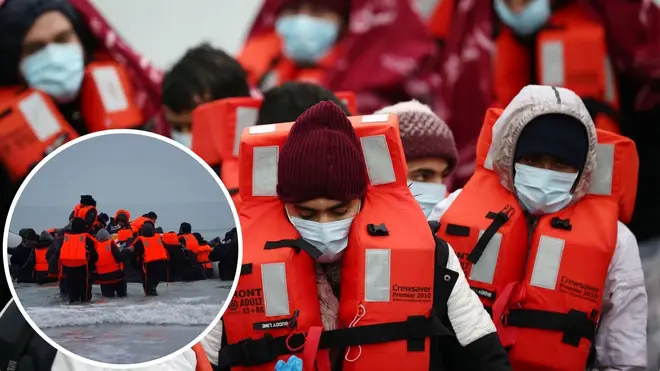
Shelagh Fogarty 1pm - 4pm
4 January 2022, 00:01

More than 28,300 people crossed the English Channel to the UK aboard small boats in 2021, triple the number for 2020.
Ministers have been warned arrivals will continue and more people will drown in the narrow sea between France and Britain if the Government pursues its "dangerous and callous policy".
The last 12 months have seen smugglers packing more and more people aboard larger and larger dinghies.
The dangers of the Channel were laid bare on November 24 when at least 27 people died as their boat sank.
READ MORE: Migrants held in 'unacceptable, degrading' conditions, UK inspectors find
READ MORE: Living in Syria 'scarier' than risking life in Channel: LBC speaks to migrants in Calais
Last year's record number - an increase of about 20,000 on 2020 - came despite millions of pounds promised to French authorities to tackle the issue.
A Home Office minister said the Government is "reforming" its approach to asylum through its New Plan for Immigration.
Figures for small boat crossings, based on Home Office data, show the number of arrivals peaked in November when, despite dropping temperatures, at least 6,869 people reached the UK.
Between November 10 and 16 more than 3,100 made the perilous crossing, the most in any seven-day stretch in the current crisis.
The same month also saw a new record for a single day, with 1,185 people reaching British shores aboard 33 boats on November 11.
Going into 2021 the most arrivals on a single day had been 416, set in September 2020.
Overall, at least 28,395 people reached the UK aboard small boats in 2021, according to the analysis.

Caller on migrant crisis clashes with Andrew Castle
This is still just a fraction of the number of people reaching Europe, with at least 120,441 arriving via the Mediterranean by land and sea in 2021, according to data from the United Nations High Commissioner for Refugees.
Despite international efforts to crack down on people smugglers, gangs have continued to ply the Dover Strait with their deadly trade, charging thousands of pounds for a berth in flimsy inflatable boats.
Tim Naor Hilton, chief executive at Refugee Action, said the UK Government's policy will lead to more deaths in the Dover Strait.
He said: "[In November] we saw the deadly result of their strategy of keeping people out rather than keeping people safe, when at least 27 people died near our coast.
"And yet the Government wants to legalise this dangerous and callous policy in its Anti-Refugee Bill, which will only lead to more people drowning. It must wake up and scrap this bill now."
Clare Moseley, founder of charity Care4Calais which supports refugees living in northern France, said rising numbers of small boat arrivals in Britain reflect a shift away from attempts to cross by lorry.
"They are some of the most vulnerable people in the world, having lost family members in bloody conflicts, suffered horrific torture and inhumane persecution," she said.

Sudanese caller speaks out on migrant deaths in Channel
"The Government tells us that people should travel by legal means but, if this were truly possible, why would so many be risking their lives in flimsy boats?
"If the Government were serious about stopping people smugglers, it would create a safe way for people to claim asylum."
Home Office minister Tom Pursglove MP said: "Seeking asylum for protection should not involve people asylum shopping country to country, or risking their lives by lining the pockets of criminal gangs to cross the Channel."
He said the Government is "reforming" its approach by "making the tough decisions to end the overt exploitation of our laws and UK taxpayers".
Mr Pursglove added: "The public have been crying out for reform for two decades and that's what this Government is delivering through our New Plan for Immigration.
"The Nationality and Borders Bill will make it a criminal offence to knowingly arrive in the UK illegally and introduce life sentences for those who facilitate illegal entry into the country.
"It will also strengthen the powers of Border Force to stop and redirect vessels, while introducing new powers to remove asylum seekers to have their claims processed outside the UK."